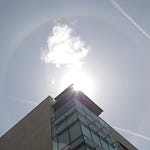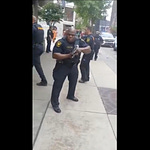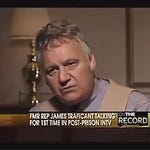Anyone who is against the LAUSD is a friend of mines. This is the “outfit” that tried to destroy me, and succeeded in destroying entire generations of young men and women in South Central Los Angeles. They are a crime mill, as they “mill out” gang members, criminals and miscreants in wholesale numbers. The jails and prisons in California are filled with their “accomplishments.” Not satisfied to destroy, ravage, traumatize, and abuse small children or teens, they decided to direct their evil towards the disciples of evil who were helping them destroy the children. The staff. That's how psychotic the entity is. It eats it own.
Never mind that the “medical” dictates did not make sense, they were to be followed or else. Well, the staff sued and in federal appeals court, they won! The case ended any future vaccine mandates in the 9th circuit jurisdiction, which is California, Oregon, Nevada, Washington, Idaho, Montana, I believe.
So state workers, county workers, private sector, and the people of the land have just been “emancipated” from the CDC slave plantation. I never was on it...
“Accordingly, LAUSD has not carried its heavy burden to show that there is no reasonable possibility that it will again revert to imposing a similar policy,” the opinion states wrote.
They also indicated they were open to arguments over the effectiveness of the vaccine, which the U.S. Centers for Disease Control and Prevention describes as a safe way to build immunity against COVID-19.”
“At this stage, we must accept Plaintiffs’ allegations that the vaccine does not prevent the spread of COVID-19 as true,” Judge Ryan Nelson wrote. The opinion characterizes that aspect of the ruling as preliminary, and something that would be argued at a lower court.
In a concurring opinion, Judge Daniel Collins invoked Supreme Court precedent that “compulsory treatment for the health benefit of the person treated — as opposed to compulsory treatment for the health benefit of others — implicates the fundamental right to refuse medical treatment.”
“The plaintiffs alleged that the vaccines do not prevent someone from becoming infected with COVID-19 and characterized it as a treatment rather than a “traditional vaccine.”
“The panel vacated the district court’s order dismissing plaintiffs’ action alleging that the COVID-19 vaccination policy of the Los Angeles Unified School District (“LAUSD”)—which, until twelve days after oral argument, required employees to get the COVID-19 vaccination or lose their jobs—interfered with their fundamental right to refuse medical treatment.”
“The panel held that the voluntary cessation exception to mootness applied. LAUSD’s pattern of withdrawing and then reinstating its vaccination policies was enough to keep this case alive. The record supported a strong inference that LAUSD waited to see how the oral argument in this court proceeded before determining whether to maintain the Policy or to go forward with a pre-prepared repeal option. LAUSD expressly reserved the option to again consider imposing a vaccine mandate. Accordingly, LAUSD has not carried its heavy burden to show that there is no reasonable possibility that it will again revert to imposing a similar policy.”
“Addressing the merits, the panel held that the district court misapplied the Supreme Court’s decision in Jacobson v. Massachusetts, 197 U.S. 11 (1905), in concluding that the Policy survived rational basis review. Jacobson held that mandatory vaccinations were rationally related to preventing the spread of smallpox. Here, however, plaintiffs allege that the vaccine does not effectively prevent spread but only mitigates symptoms for the recipient and therefore is akin to a medical treatment, not a “traditional” vaccine. Taking plaintiffs’ allegations as true at this stage of litigation, plaintiffs plausibly alleged that the COVID-19 vaccine does not effectively “prevent the spread” of COVID-19. Thus, Jacobson does not apply. Concurring, Judge R. Nelson wrote separately to point out that this Circuit’s intervening case Kohn v. State Bar of California, 87 F.4th 1021 (9th Cir. 2023) (en banc), raises the question of whether the district court’s holding that the Los Angeles Unified School District is entitled to sovereign immunity should be revisited on remand.”
“Concurring, Judge Collins wrote separately to address a crucial point that the district court overlooked. Pursuant to more recent Supreme Court authority, compulsory treatment for the health benefit of the person treated—as opposed to compulsory treatment for the health benefit of others— implicates the fundamental right to refuse medical treatment. Plaintiffs’ allegations here are sufficient to invoke that fundamental right. Defendants note that the vaccination mandate was imposed merely as a “condition of employment,” but that does not suffice to justify the district court’s application of rational-basis scrutiny. Dissenting, Judge Hawkins wrote that because there is no longer any policy for this court to enjoin, he would, as this court has done consistently in actions challenging rescinded early pandemic policies, hold that this action is moot, vacate the district court’s decision, and remand with instructions to dismiss the action without prejudice.”
“In Jacobson, the Supreme Court balanced an individual’s liberty interest in declining an unwanted smallpox vaccine against the State’s interest in preventing disease. 197 U.S. at 38. The Court explained that the “principle of vaccination” is “to prevent the spread of smallpox.” Id. at 31–32. Because of this, the Court concluded that the State’s interest superseded Jacobson’s liberty interest, and the vaccine requirement was constitutional. Id.”
“Plaintiffs argue that a “traditional vaccine” must provide immunity and prevent transmission, meaning that it must “prevent the spread” of COVID-19. Plaintiffs allege that the vaccine does not effectively prevent spread, but only mitigates symptoms for the recipient. And Plaintiffs claim that something that only does the latter, but not the former, is like a medical treatment, not a “traditional” vaccine. This interpretation distinguishes Jacobson, thus presenting a different government interest. Putting that aside, the district court held that, even if it is true that the vaccine does not “prevent the spread,” Jacobson still dictates that the vaccine mandate challenged here is subject to, and survives, the rational basis test. The district court reasoned that “Jacobson does not require that a vaccine have the specific purpose of preventing disease.” Reilly, 2022 WL 5442479, at *5 (emphasis in original). It acknowledged Plaintiffs’ allegations that the vaccine did not “prevent transmission or contraction of COVID-19.” Id. at *6. But it declared that “these features of the vaccine further the purpose of protecting LAUSD students and employees from COVID-19,” and thus “the Policy survives rational basis review.” Id.”
“This misapplies Jacobson. Jacobson held that mandatory vaccinations were rationally related to “preventing the spread” of smallpox. 197 U.S. at 30; see also Roman Cath. Diocese of Brooklyn v. Cuomo, 592 U.S. 14, 23 (2020) (Gorsuch, J., concurring) (“Although Jacobson pre-dated the modern tiers of scrutiny, this Court essentially applied rational basis review to Henning Jacobson’s challenge . . .”). Jacobson, however, did not involve a claim in which the compelled vaccine was “designed to reduce symptoms in the infected vaccine recipient rather than to prevent transmission and infection.” Reilly, 2022 WL 5442479, at *5. The district court thus erred in holding that Jacobson extends beyond its public health rationale—government’s power to mandate prophylactic measures aimed at preventing the recipient from spreading disease to others—to also govern “forced medical treatment” for the recipient’s benefit. Id. at *5.”
“At this stage, we must accept Plaintiffs’ allegations that the vaccine does not prevent the spread of COVID-19 as true. Twombly, 550 U.S. at 556. And, because of this, Jacobson does not apply. LAUSD cannot get around this standard by stating that Plaintiffs’ allegations are wrong. Nor can LAUSD do so by providing facts that do not contradict Plaintiffs’ allegations. It is true that we “need not [] accept as true allegations that contradict matters properly subject to judicial notice.” Sprewell v. Golden State Warriors, 266 F.3d 979, 988 (9th Cir. 2001). But even if the materials offered by LAUSD are subject to judicial notice, they do not support rejecting Plaintiffs’ allegations. LAUSD only provides a CDC publication that says “COVID-19 vaccines are safe and effective.” But “safe and effective” for what? LAUSD implies that it is for preventing transmission of COVID-19 but does not adduce judicially noticeable facts that prove this. We note the preliminary nature of our holding.”
“We do not prejudge whether, on a more developed factual record, Plaintiffs’ allegations will prove true. But “[w]hether an action ‘can be dismissed on the pleadings depends on what the pleadings say.’” Marshall Naify Revocable Tr. v. United States, 672 F.3d 620, 625 (9th Cir. 2012) (quoting Weisbuch v. County of Los Angeles, 119 F.3d 778, 783 n.1 (9th Cir. 1997)). Because we thus must accept them as true, Plaintiffs have plausibly alleged that the COVID-19 vaccine does not effectively “prevent the spread” of COVID-19. Thus, Jacobson does not apply, and so we vacate the district court’s order of dismissal and remand.”
Side note “…and since LAUSD wanted to play hard ass, now they have the courts looking at their 11th Amendment shield that they have utilized to keep people like me, pro se, and attorneys from destroying them in federal court for their crimes…
“We have held that California school districts have sovereign immunity, relying on Mitchell. See, e.g., Belanger v. Madera Unified Sch. Dist., 963 F.2d 248, 254 (9th Cir. 1992); Sato v. Orange Cnty. Dep’t of Educ., 861 F.3d 923, 934 (9th Cir. 2017). That said, we have held that school districts in other states are not. The reasons for this differing result are now suspect under Kohn. Given this, it must be reassessed whether California school districts are an “arm of the state.” ...Our new entity-based test in Kohn seems to conflict with (and likely overrule) our reasoning in Belanger and Sato. Because of this, the district court’s holding that LAUSD is an “arm of the state” (as well as our prior holdings in Belanger and Sato) may need to be revisited. Cf. Reilly, 2022 WL 5442479, at *3 (relying on Mitchell to determine that LAUSD has Eleventh Amendment immunity.”
“I agree that this case is not moot and that Jacobson v. Massachusetts, 197 U.S. 11 (1905), is not controlling under the well-pleaded allegations of Plaintiffs’ complaint. I therefore concur in the majority opinion. I write separately to emphasize a crucial point the district court overlooked. The district court in this case explicitly held that Jacobson governs Plaintiffs’ substantive due process claim even if one assumes the truthfulness of the complaint’s allegations that the Covid vaccines are not very effective at preventing infection and transmission and that their value is primarily in reducing disease severity for those recipients of the vaccine who thereafter contract Covid. As the majority explains, Jacobson did not involve a comparable claim and is not controlling authority with respect to it. In my view, the district court further erred by failing to realize that these allegations directly implicate a distinct and more recent line of Supreme Court authority, in which the Court has stated that “[t]he principle that a competent person has a constitutionally protected liberty interest in refusing unwanted medical treatment may be inferred from [the Court’s] prior decisions.” Cruzan ex rel. Cruzan v. Director, Mo. Dep’t of Health, 497 U.S. 261, 278–79 (1990) (citing, not only Jacobson, but a series of later “cases support[ing] the recognition of a general liberty interest in refusing medical treatment”).”
“In Washington v. Glucksberg, 521 U.S. 702 (1997), the Court explained that Cruzan’s posited “‘right of a competent individual to refuse medical treatment’” was “entirely consistent with this Nation’s history and constitutional traditions,” in light of “the common-law rule that forced medication was a battery, and the long legal tradition protecting the decision to refuse unwanted medical treatment.” Id. at 724–25 (citation omitted). Given these statements in Glucksberg, the right described there satisfies the history-based standards that the Court applies for recognizing “fundamental rights that are not mentioned anywhere in the Constitution.” Dobbs v. Jackson Women’s Health Org., 597 U.S. 215, 237–38 (2022). The Supreme Court’s caselaw thus clarifies that compulsory treatment for the health benefit of the person treated—as opposed to compulsory treatment for the health benefit of others— implicates the fundamental right to refuse medical treatment. Plaintiffs’ allegations here are sufficient to invoke that fundamental right. Defendants note that the vaccination mandate was imposed merely as a “condition of employment,” but that does not suffice to justify the district court’s application of rational-basis scrutiny. See Lane v. Franks, 573 U.S. 228, 236 (2014) (“[The] Court has cautioned time and again that public employers may not condition employment on the relinquishment of constitutional rights.)”
FULL CASE HERE:
https://cdn.ca9.uscourts.gov/datastore/opinions/2024/06/07/22-55908.pdf
In other words, “it's a wrap.” It's not a vaccine, it does not prevent anything and the Appellate court has said so. Can't mandate something that does not work. I tried to tell everyone this over 5 years ago. Nobody listened. Now they will.
Lord have Mercy



















Vaccine Mandates Done